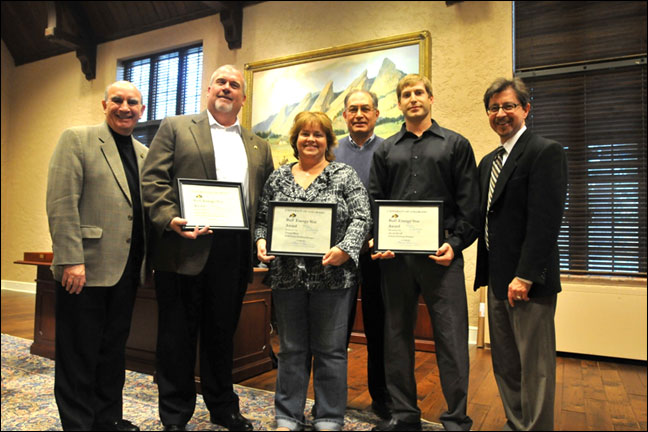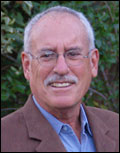People
Boulder employees rewarded for energy improvements

Photo: Casey A. Cass/University of Colorado |
| From left, Chancellor Phil DiStefano, John Culshaw, Donna Maes, Moe Tabrizi, David Nicoll and Vice Chancellor for Administration Frank Bruno. |
As part of ongoing efforts to reduce its environmental footprint and the campus energy bill, the University of Colorado at Boulder is rewarding employees $1,000 each for reducing building energy usage by at least 5 percent over the previous fiscal year.
This year, building proctors John Culshaw, David Nicoll and Donna Maes took the energy challenge to heart and reduced Norlin, Hellems and Math buildings' electricity use by a combined total of 11.6 percent. They will each receive a one-time $1,000 cash bonus from CU-Boulder Vice Chancellor for Administration Frank Bruno. The three buildings conserved 645,000 kWh, reduced carbon dioxide emissions by over 1 million pounds and saved the Boulder campus nearly $65,000.

Professor named associate dean at UC Denver's CLAS
 |
| Franklin |
Jeff Franklin, associate professor of English at the University of Colorado Denver's College of Liberal Arts and Sciences (CLAS), has been named associate dean for curriculum and student affairs.
Franklin is a scholar and poet with book publications in both areas. A self-described cultural historian, he conducts research on 19th-century British literature and culture. His most recent book is "The Lotus and the Lion: Buddhism and the British Empire" (Cornell, 2008).
An alumnus of the CU system's Excellence in Leadership Program, he has served the college and the university in multiple capacities, most notably as chair of the CLAS Council over the past two years. He also has co-chaired the educational policy and planning committee and has been a member of several groups: the academic standards committee, the educational policy and curriculum committee, two dean search committees, the Graduate Council and the educational policy committee of the university system. Over the course of a decade at UC Denver, he has served the English department as a major adviser and graduate director and has contributed to a number of new course developments and major curriculum revisions.

Navy interested in Denver researchers' breakthrough
Researchers from the University of Colorado Denver College of Engineering and Applied Science may have discovered a way to desalinate water, treat wastewater and produce electricity.
Last year, a study published in Environmental Science & Technology incorporated desalination into microbial fuel cells, a new technology that can treat wastewater and produce electricity simultaneously. However, putting it into practical use proved to be challenging due to current fluctuation.
Zhiyong (Jason) Ren and his team with the University of Colorado Denver discovered they could produce hydrogen gas, which is collectable and storable, thus making improvements in the technology. The study, titled "Concurrent Desalination and Hydrogen Generation Using Microbial Electrolysis and Desalination Cells," was published in Environmental Science & Technology (DOI: 10.1021/es1022202) on Dec. 1 and is funded by the Office of Naval Research.
"Ships and their crews need energy generated on-site as well as fresh drinking water," Ren said. "Thus, the Navy is very interested in both low-energy desalination and renewable energy production."
A recent study by Logan group at Penn State University also demonstrated similar findings.
Ren and his team now will use real wastewater to test the efficiency as well as optimizing the reactor configuration to improve system performance.
"This discovery is a milestone for our new research group," Ren said. "We are very excited about our findings and will continue working to improve the technology."

Professor examines monetization in modern music business
 |
| Gloor |
Storm Gloor, assistant professor in the music business program at the University of Colorado Denver's College of Arts and Media, says the online music industry still is in the midst of big change. His study "Can the Madness be Monetized? An Exploratory Survey of Music Piracy and Acquisition Behavior" recently was published in the annual edition of Music & Entertainment Industry Educators Association (MEIEA) Journal. Gloor co-authored the paper with Belmont University professor Clyde Rolston.
"The research paper is based on analysis of data collected from our survey of more than 1,200 consumers regarding their views and practices regarding music piracy and how they acquire their music," Gloor said. "Our study found, for instance, that respondents were actually willing to pay a much higher monthly price for an 'all you can eat' unlimited download service than what the music industry has generally considered the highest price they could charge for such a program. We also found that those consumers used to not paying for music were just as willing as those actually purchasing it to use ad-supported free music services, a business model that has not yet been fully supported by major U.S. record companies though it is popular in other countries. Such a service could both reduce piracy and provide additional revenues to record companies and artists."
MEIEA is an international organization formed in 1979 to bring together educators with leaders of the music and entertainment industries. Its primary goal is to facilitate an exchange of information between educators and practitioners in order to prepare students for careers in the music and entertainment industries

President's Teaching Scholar at international symposium this week
Glenn Morris, a professor of political science and President's Teaching Scholar at the University of Colorado Denver, will present a paper at the University of South Australia regarding the United Nations Declaration on the rights of indigenous peoples.
Morris is director of the CU's Fourth World Center for the Study of Indigenous Law and Politics. He also served as a delegate to the UN Commission on Human Rights (now the United Human Rights Council), the UN Working Group on Indigenous Populations, and the UN Permanent Forum on Indigenous Issues.
The international symposium, "2007 Declaration on the Rights of Indigenous People – Indigenous Survival: Where To From Here?" will be conducted Dec. 9-10 and will include indigenous community members, international lawyers, academics and activists who have worked in the area of international law and the rights of Indigenous Peoples from the 1970s up until the present.
Morris will present "The Twisted Journey of the United Nations Declaration on the Rights of Indigenous Peoples." The paper examines the original philosophy and vocabulary of Indigenous liberation that motivated the strategy of Indigenous Peoples to enter the United Nations processes in 1977, the development of the UN Working Group on Indigenous Populations in 1981, and the drafting of the Declaration on the Rights of Indigenous Peoples over a 12-year period.

Jet-flown telescope will deliver data to Boulder researcher
Paul Harvey, a senior research associate at the University of Colorado at Boulder's Center for Astrophysics and Space Astronomy, is one of two scientists who will use data gathered by a world-class telescope flying aboard a modified Boeing 747 to peer at a distant star-forming region during its inaugural science flight.
Known as the Stratospheric Observatory for Infrared Astronomy, or SOFIA, the jet was significantly modified in order to mount a 2.5-meter reflecting telescope in the rear fuselage, Harvey said.
The jet will fly at 40,000 to 45,000 feet in altitude, putting it above more than 99 percent of the water vapor in the atmosphere – which blocks infrared light from reaching the ground – and will allow scientists to observe stellar targets in wavelengths of light that can't be observed by ground-based telescopes.
Harvey will observe and analyze the distribution of dust and gas in a young, star-forming cluster known as Sharpless 140 that is roughly 3,000 light-years from Earth in the constellation Cepheus. One light-year is equal to about 6 trillion miles.
"Observing the birth of stars in our own galaxy is critical because planetary systems form at the same time that a central star is formed," Harvey said. "In addition, some of the most luminous galaxies in the universe appear to be powered by extreme bursts of star formation."
NASA hopes SOFIA will continue to fly astronomical science observations for the next two decades, with research flights expected to ramp up to two or three flights a week by 2015. SOFIA's suite of instruments are expected to gather new information on a wide variety of astronomical targets, including black holes, distant galaxies, the formation of stars and planets, and up close views of comets and asteroids. SOFIA is a joint project between NASA and the German Aerospace Center.

Dropping names ...
 |
| Shockley-Zalabak |
 |
| Greenberg |
 |
| Keränen |
University of Colorado at Colorado Springs Chancellor Pam Shockley-Zalabak recently was selected to work on Governor-elect John Hickenlooper's education transition team. Hickenlooper will take office next month. ... Ed Greenberg's most recent published book was reviewed in several news publications. Greenberg is director of special projects at the Institute of Behavioral Science at the University of Colorado at Boulder. His book, "Turbulence: Boeing and the State of American Workers and Managers," was published by Yale University Press. Written with Leon Grunberg, Sarah Moore and Pat Sikora, the book was one result of a multiyear, longitudinal study – funded by the National Institutes of Health – that examines the impact of corporate restructuring (defined as downsizing, job reengineering, and new forms of authority) on employees, including their mental and physical health, and their social and political outlooks. ... Bioscience Discovery Evaluation Grant Program (BDEGP) grants for 2010-2011 have been awarded to University of Colorado Denver Bioengineering Chair and Professor Robin Shandas and to Bioengineering Assistant Professor Emily A. Gibson, along with Electrical Engineering Assistant Professor Tim C. Lei. The program was created by the Legislature to foster development of the industry in Colorado; it supports technology transfer and commercialization with grants to qualified research institutions and to early-stage companies. ... Lisa Keränen, associate professor and director of graduate studies in communication at the University of Colorado Denver, was elected second vice-president of the Association for the Rhetoric of Science and Technology (ARST), a scholarly society for researchers and teachers interested in the role of rhetoric in science and technology, at the group's annual meeting in mid-November in San Francisco. Keränen will oversee plans for the group's annual mini-conference for 2012 and its convention program for 2013, at which point she will become president of the organization. ... Marty Otanez, assistant professor of anthropology at the University of Colorado Denver, co-authored with Laura Graen "Malawi: Tobacco Versus Development," a report in Bulletin of the Framework Convention Alliance, Issue 110, Nov. 20. He also delivered "Discourse Ecologies and Global Tobacco Leaf Markets," an invited presentation for the Trade, Health and Social Justice session at the 138th annual American Public Health Association Meeting in Denver on Nov. 10, and had a film showing of "Umodizi" at the Film and Media Festival with the American Public Health Association's 138th annual Meeting on Nov. 9 in Denver.
Want to suggest a colleague — or yourself — for People? Please e-mail information to Jay.Dedrick@cu.edu

|